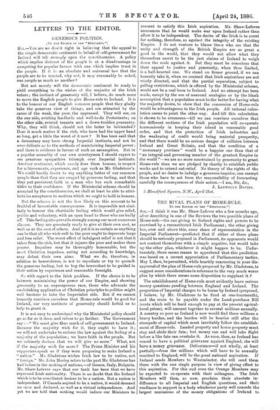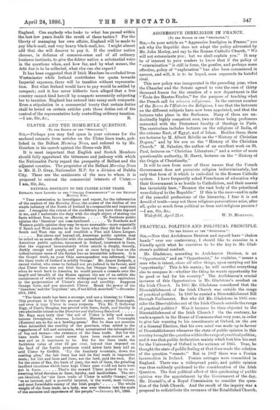THE RIVAL PLANS OF HOME-RULE.
TO THE EDITOR OF THE " SPECTATOR."] SIH,—I think it was Mr. Shaw-Lefevre who a few months ago, after describing in one of the Reviews the two possible plans of Home-rule—the one giving to Ireland rights and powers to be- exercised by a reconstituted Irish Parliament ; the other giving her, over and above this, some share of representation in the Imperial Parliament—predicted that if either of these plans- should be seriously proposed in Parliament, its opponents would not content themselves with a simple negative, but would take up the other plan, whichever it might happen to be. Unfor- tunately, there seems reason to apprehend that this prediction was based on a correct appreciation of Parliamentary tactics. May I, then, be permitted, while heartily concurring in your dis approval of the plan of Home-rule proposed by Mr. Gladstone, to suggest some considerations in reference to the very much worse plan by which there seems some disposition to supplant it ?
The establishment of Home-rule must evidently leave serious money questions pending between England and Ireland. The proportion of Imperial charges to be borne by Ireland (proposed, I believe, by Mr. Gladstone to be fixed at one-fourteenth), and the rents to be payable under the Land-purchase Bill (rents which will be hard enough to pay at the present agricul- tural prices), will amount together to several millions annually. A country so poor as Ireland is now would find these millions a heavy burden, and the burden will be heavier still after the- stampede of capital which must inevitably follow the establish- ment of Home-rule. Landed property and house property must stay and abide their fate ; but money can and will take flight- before a like fate can overtake it. As soon, then, as Ireland has ceased to have a political grievance against England, she will have a money grievance. Deliverance—if not wholly, at least partially—from the millions which will have to be annually remitted to England, will be the great national aspiration. If Ireland sends Members to Westminster, she will send them there with the one single purpose in view of giving effect to this aspiration. For this end even the Orange Members may be expected to co-operate with their colleagues. The Irish Members will then, as now, proclaim their absolute in- difference to all Imperial and English ,questions, and their readiness to support in a body whichever party will concede the largest remissions of the money obligations of Ireland to
England. Can anybody who looks to what has passed within the last few years doubt the result of these tactics ? For the liberty of managing her own affairs, England will be made to pay black-mail, and very heavy black-mail, too. I might almost add that she will deserve to pay it. If the creditor nation chooses, in defiance of common-sense and of all ordinary business instincts, to give the debtor nation a substantial voice in the questions when, and how far, and by what means, the debt due is to be collected, what else can she expect ?
It has been suggested that if Irish Members be excluded from Westminster while Ireland contributes her quota towards Imperial expenses, there will be taxation without representa- tion. But what Ireland would have to pay would be settled by compact; and it has never hitherto been alleged that a free country cannot bind herself by compacts necessarily subjecting her to taxation. England has entered into many such compacts. Even a stipulation in a commercial treaty that certain duties shall be levied on certain articles puts those duties out of the control of the representative body controlling ordinary taxation.



































 Previous page
Previous page